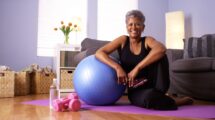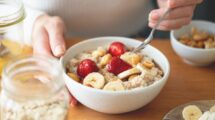
Take Charge
By Susan Cable, RHN
“You just have to live with it.” This is what I hear repeatedly from my clients with IBS (irritable bowel syndrome) who have been medically diagnosed with this uncomfortable disorder. Many individuals live with IBS most of their lives without knowing they are actually suffering from an illness.They go through life thinking diarrhea, gas, and stomach discomfort after eating is normal.They are told, “You just have to live with it” by the medical society.
Fortunately and unfortunately over the last decade, IBS has become, what I consider to be, an epidemic, and more research has been done on IBS, which has led to a better understanding of this imbalance.There are now many prescription and over-the counter medications to aid the symptoms of this disorder.There are also many natural approaches available through holistic health-care practitioners which show remarkable results in eliminating this illness.
As a nutritionist, I don’t understand how anyone can feel like this and believe it’s “OK.” As a foodie, I believe we should feel fantastic after eating a good meal. I’m the first one to admit I feel horrible after consuming a meal of fast food or readily prepared food (which I do only once or twice a year with regret), but after a wonderful meal of whole, natural foods, I feel like a million bucks. And I believe with all of my heart and soul that this is what Mother Nature wants for us.
Today’s industrialized farming has laced our food with hormones, antibiotics, pesticides, herbicides and much more. Over-farming has depleted our soil of the nutrients we expect to be in the food we eat, therefore fertilizers are required to boost the nutritional value of food. These vitamins and minerals are of course, synthetic. My argument is, can the human body digest and utilize these chemicals and additives? I think not. And I am confident I can speak for not only myself, but also for my colleagues, that this is the mainstay of IBS for many people.
Our foods today contain chemicals, preservatives, artificial colours and flavourings, and these are considered to be artificial foods. Nutritional research has sug gested that these anti-nutrients have a way of harming the intestinal lining, the endocrine system (thyroid, pituitary, and adrenals) and the immune system. It is also suggested that a diet rich in refined sugars and starches (enriched and bleached flours) may lead to an abundance of unhealthy bacteria in the colon, known as candida, and this can, over time, lead to food allergies, IBS, and autoimmune disease.
In my 17 years of practising as a holistic nutritionist, I have had success with my IBS clients by working with a diet which avoids the foods individuals are, or may be, sensitive to. Replenishing the healthy bacteria in the intestines (colon) and introducing a whole, natural foods diet, organic whenever possible, is always introduced.
What you need to know about IBS
One in five people suffer from this disorder — women more often than men.
IBS is also known as intestinal neurosis, mucous colitis, spastic colitis or spastic colon.
IBS is thought to be abnormal muscle contractions of the digestive tract which interferes with the normal movement of food.
IBS hinders the elimination of wastes and toxins, which leads to an excess of mucous and bacteria in the intestines (colon).
Due to the above, gas, bloating, nausea, diarrhea, constipation, a distended abdomen, headaches and vomiting may occur.
Eating often causes severe pain sometimes relieved by a bowel movement.
A sedentary lifestyle, stress, and a poor diet are thought to have an impact on the development of IBS.
Food sensitivities may have a huge impact on the development of IBS.
The process of elimination of more serious illnesses, such as Crohn’s disease, ulcerative colitis, celiac, and colon cancer is usually the determining factor of IBS. Other disorders, such as lactose intolerance, endometriosis, food poisoning, depression, diverticulitis and constipation to the point of impaction, may also present the same symptoms. Tests such as a colonoscopy, a biopsy, and a sigmoidoscopy and stool examination will help to rule out the possibility of a more serious illness.
Possible long-term effects of IBS
Malnutrition.
Increased need of protein — up to 30 per cent more than the average individual (due to the inability to properly digest and use protein).
Increased need of minerals (electrolytes which are lost through chronic diarrhea).
Candida bacteria and parasites due to foods not being properly digested and eliminated.
Increased risk of colon cancer.
Arthritis — especially the knees, wrists and ankles.
Skin disorders (when food intolerances/allergies are involved).
Liver disorders — inability to properly detoxify anti-nutrients (additives, chemicals, etc.).
There are many things you can do to help yourself with this disorder.
The first thing I recommend to my clients is to book an appointment for food sensitivity testing.There are many different alternative testings available through natural health practitioners, my favourite being blood analysis testing.This is available through naturopathic doctors and some holistic nutritionists and it tests for over 100 common foods. I find it to be extremely accurate and a great starting point for achieving optimal health.Then, eliminate all common food allergens or intolerances. Take on a high-fibre diet and eliminate all refined and processed foods. In other words, a whole, natural foods diet, local and in-season is best.

Lifestyle changes are essential when suffering with IBS. Aerobic exercise for 30 minutes a day, four times a week, is all you need to increase your metabolism and help your body get rid of all the stuff. The biggest mistake people make when it comes to exercise is doing what others do and not doing what they enjoy. Don’t go out and invest in a gym membership if you don’t like exercising in front of others, or if you’re intimidated by those gorgeous women who wear no more than a size four. Don’t buy a treadmill if you hate walking. Take a few minutes and write down activities you do enjoy and that’s where you should focus. For me, I love skipping and cycling. I own a good leather skipping rope and a fabulous road bike and spin cycle both purchased from Kijiji. Jumping on a trampoline, skateboarding, rollerblading, swimming and hiking are all enjoyable, inexpensive activities which will increase your heart rate, increase your metabolism, and ultimately help you shed a few extra pounds.
Research has shown stress amplifies the symptoms of IBS. Taking part in relaxing activities, and even the aerobic activities just mentioned, will help you feel better. Other great stress busters are yoga, guided meditation, counselling and, of course, a relaxing massage. And most importantly, enjoy life to its fullest.
Guidelines for a hypoallergenic diet
Enjoy…
All fruits, except citrus, grapes, fruit juices and dried fruit.
Gluten-free and wheat-free grains — brown rice, quinoa, oats, millet, amaranth, tapioca, buckwheat.
Legumes (some beans — avoid red kidney beans).
Nuts and seeds, except peanuts and pistachios (high in mold).
Free-range (organic if possible) poultry, wild meat, lamb, and occasionally beef and pork.
All fresh vegetables except the nightshades — potatoes, tomatoes, peppers and eggplant.
Essential fatty acids — olive oil, canola oil, flax oil, hemp and walnut oil.
Pure water (I recommend distilled) — no less than 10 cups a day. All spices, except cayenne, chili powder and paprika.
Brown rice syrup, pure maple syrup, blackstrap molasses (occasionally unpasteurized honey).
Lots of fresh vegetable juices, organic or homemade.
Fermented foods, such as plain kefir, natural sauerkraut, miso, kimchi.
There’s no better time to take a new outlook towards your health. So tell yourself you’re not going to “just live with it” any longer, take control of your health, find out what food sensitivities you may have, work with a holistic nutritionist and start living life comfortably. You’ll be surprised just how good you can feel. n
 Susan Cable is a registered holistic nutritionist, educator, competitive body builder and business owner. She is senior academic advisor for the Canadian School of Natural Nutrition, where she aids in the education of students worldwide in holistic nutrition. She works and lives in Hastings, Ontario.
Susan Cable is a registered holistic nutritionist, educator, competitive body builder and business owner. She is senior academic advisor for the Canadian School of Natural Nutrition, where she aids in the education of students worldwide in holistic nutrition. She works and lives in Hastings, Ontario.
FIFTY-FIVE PLUS MAGAZINE DOES NOT CLAIM TO BE AN AUTHORITY ON HEALTH-RELATED TOPICS.THE PUBLISHER CONTINUALLY ENCOURAGES READERS TO TAKE ALL SOURCES OF INFORMATION INTO CONSIDERATION WHEN IT COMES TO MAKING DECISIONS ABOUT ALL ASPECTS OF LIFE: HEALTH, FINANCE OR NUTRITION. /.






